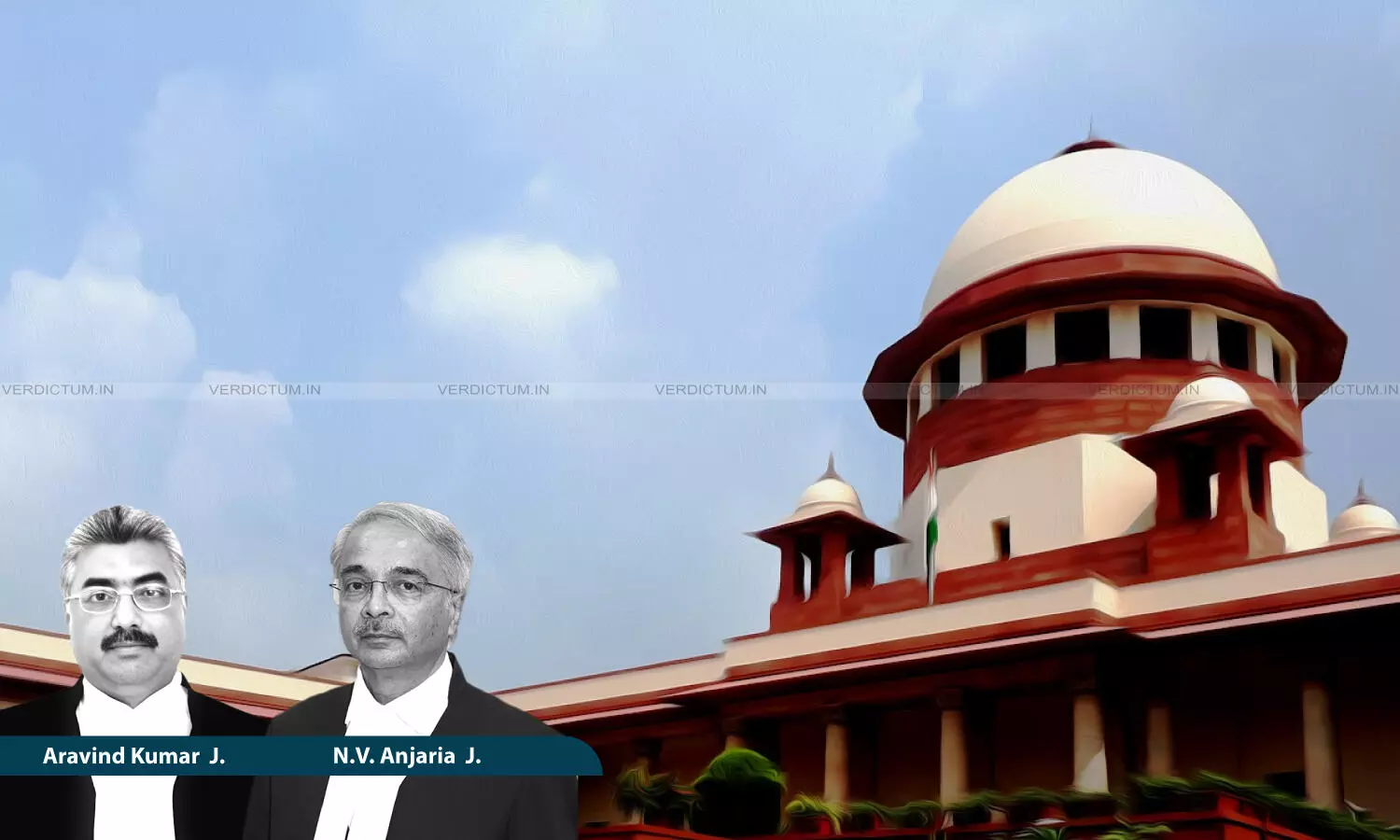
Justice Aravind Kumar, Justice NV Anjaria, Supreme Court
Genuine Exporters Must Not Be Driven To Needless Litigation On Account Of Inadvertent Procedural Lapses: Supreme Court
 |
|The Supreme Court was considering an Appeal against a judgement of the High Court by which the Writ Petition instituted by the Appellant was dismissed.
The Supreme Court has directed the Central Government to ensure that genuine exporters are not driven to needless litigation on account of inadvertent procedural lapses which have been rectified in accordance with law.
The Court was considering an Appeal against a judgement of the High Court by which the Writ Petition instituted by the Appellant was dismissed.
The Division Bench of Justice Aravind Kumar and Justice NV Anjaria observed, ".....The scheme under Chapter 3 of the FTP is a beneficial one, intended to reward exporters. Once exports are genuine and fall within the notified category, inadvertent mistakes of procedure cannot be treated as fatal, especially where they are corrected under statutory authority. The rejection by the PRC, bereft of reasons and passed without hearing, falls foul of the principles of natural justice. The High Court’s view that the appellant may proceed against the customs broker fails to address the statutory entitlement which accrues to the exporter under the scheme. Administrative technology must aid, not obstruct, the implementation of the law."
The Appellant was represented by Advocate Gagan Sanghi, while the Respondent was represented by Advocate-on-Record Raj Bahadur Yadav.
Facts of the Case
The Appellant, a private company engaged in the export of corn starch effected 54 shipping bills in 2017 under Serial to the Foreign Trade Policy (FTP) 2015–20 and was eligible for incentive under the Merchandise Exports from India Scheme. For each of these consignments, shipping bills were filed electronically on the ICEGATE platform through the Appellant’s customs broker. It so happened that in the column requiring a declaration of intent to claim reward, the default entry “No” which was to be altered as “Yes” was not done by Customs broker. This inadvertent omission, though clerical in nature, prevented the shipping bills from being transmitted to the repository of the Directorate General of Foreign Trade (DGFT). The consequence was that the Appellant’s claim for MEIS reward could not be processed electronically.
On discovering the error, the Appellant addressed a representation to the Regional Authority of DGFT. At the same time, an Application was made before the Deputy Commissioner of Customs invoking Section 149 of the Customs Act, 1962. By an order, the Deputy Commissioner allowed the amendment of all shipping bills, so that the declaration “No” was substituted by “Yes”. The fact of this correction is not in dispute. Despite the correction, when the Appellant pursued the matter with DGFT, it was informed that the system permitted no manual intervention and that unless the shipping bills were originally transmitted with the entry “Yes”, they could not be processed. The Appellant as a consequence, was compelled to approach the Policy Relaxation Committee
The PRC, however, by a cryptic e-mail, rejected the claim, stating merely that no merit or hardship was made out. No reasons were assigned, nor was the Appellant afforded an opportunity of being heard. Aggrieved, the Appellant instituted Writ Petition. During its pendency, a Division Bench of the Bombay High Court delivered its judgment in Portescap India Private Limited v. Union of India & Others in 2021, dealing with an identical issue. A pursis was filed by the Appellant bringing the judgment to the notice of the Court. Nonetheless, by its judgment, the High Court dismissed the writ petition.
Counsel for the Appellant submitted that the exports were genuine, covered under the notified products in Appendix 3B, and that the intention to claim MEIS was evident from the invoices. It was urged that once the Customs authority had corrected the shipping bills under Section 149, the bills stood regularized in law and were required to be acted upon. Further it was contended that the rejection by the PRC was arbitrary and violative of the principles of natural justice as no reasons were assigned nor hearing granted. Further it was submitted that the High Court, erred in relegating the appellant to pursue remedies against the broker, when the entitlement arose under the statutory scheme. Reliance was placed upon Portescap India Private Limited (supra), which had attained finality.
Reasoning By Court
The principal question for Court's consideration was as whether an inadvertent error in the shipping bills, which was permitted to be corrected under Section 149 of the Customs Act, can defeat an exporter’s claim under the MEIS?
The Court referred to the rulings of the Bombay High Court and ruled that once exports are genuine and fall within the notified category, inadvertent mistakes of procedure cannot be treated as fatal, especially where they are corrected under statutory authority.
The Appeal was accordingly allowed.
Cause Title: M/s Shah Nanji Nagsi Exporters Pvt. Ltd. vs. Union of India and Ors. [Neutral Citation: 2025 INSC 1032]
Appearances:
Appellant- Advocate Gagan Sanghi, Advocate Farah Hashmi, Advocate-on-Record Rameshwar Prasad Goyal
Respondent- Advocate-on-Record Raj Bahadur Yadav, Additional Solicitor General S Dwarakanath, Advocate-on-Record Gurmeet Singh Makker, Advocate Rohit Khare, Advocate Digvijay Dam, Advocate Navanjay Mahapatra, Advocate Ishaan Sharma, Advocate Raghav Sharma, Advocate Rajat Vaishnaw, Advocate Abhyudey Kabra
Click here to read/ download Order